When I Started Choosing Embroidery Patterns For My Store, I Was Really Focused On Relatively Small, Simple
When I started choosing embroidery patterns for my store, I was really focused on relatively small, simple designs. Things that would be quick and easy for beginners. But honestly... I think I underestimated just how easy the printed interfacing would be, since it's the needlework version of completing a dot-to-dot patterns. They take time, but none of the constant counting and ripping stitches out.
So that meant I've started to get ambitious. Little designs are still great, but what about a few designs that are dazzling from the other side of the room? As a treat?


Maybe just one of Giovanni Ostaus's shirt opening border designs from 1561?

Some fancy chickens and um... tulips? pomegranates? water fountains?

And just for me, a pattern you won't find in any history book, a little confection I made that I like to call: "Strawberry Fieldmice Forever"

That's only like, half of them. I just dumped a whole bunch onto my Etsy.
Interested?
Beginner-friendly historical and fantasy embroidery patterns, right this way!
More Posts from Clusterfrock and Others

The Párisi Udvar in Budapest, Hungary. Arcade/department store/ galleria built 1907-1913, in a mix of styles- venetian gothic, orientalism, jugendstil, renaissance.



Some colors just make my heart happy. This gown is peak Gothic, dating from 1840-1850, potentially of German origin. If you like layer cake gowns with staying power, this is ideal.
Miles of rose pink taffeta silk, Chinese style embroidery, and those mirrored V shapes at the bodice top and bottom just make this perfect for a princess (or a princess at heart). The embroidery at the bottom of the bodice just kills me it's so beautiful and delicate. Monochrome can be so beautiful!
Image Credit: © Historic Deerfield, Inc.


La Mode nationale, no. 17, 25 avril 1896, Paris. Notre patron découpé (Grandeur naturelle). Corsage à pointe. Bibliothèque nationale de France
Détails et Explication du patron découpé:
Ce modèle forme pointe devant très court sur les hanches; des coques de même étoffe, doublèes de soie assortie, forment petite basque; les pinces sont ornées d'un galon brodé. (This model has a pointed front shape, very short on the hips; shells of the same fabric, lined with matching silk, form a small peplum; the clips are decorated with an embroidered braid.)
Ce patron se compose de six morceaux. (This pattern consists of six pieces.)
No. 1. — Le devant. (The front.)
No. 2. — Le premier côté; un cran indique le raccord au devant. (The first side; a notch indicates the connection at the front.)
No. 3. — Le deuxième côté; deux crans indiquent le raccord au premier côté. (The second side; two notches indicate the connection to the first side.)
No. 4. — Le jockey de la manche. (The jockey for the sleeve.)
No. 5. — Le dos, coupé long de façon à former une coque en repliant le bas à l'endroit indiqué par un cran de chaque côté. (The back, cut long so as to form a shell by folding the bottom at the place indicated by a notch on each side.)
No. 6. — La manche ballon, demi-longue; un trait à la roulette indique le dessous. (The balloon sleeve, half-length; a roulette line indicates the bottom.)
Métrage: 1m,50 tissu grande largeur; 0m,70 soie ou satin pour l'intérieur des coques.
Black & Gold 1870s Natural Form Dress

Quite possibly my most sparkly dress to date! I had plans to attend a Victorian weekend at the end of February, which included a Saturday night ball. Having precisely zero ballgowns, and wanting to go 1870s natural form for the event I started digging around for inspiration and fabrics.
I ended up staring at a gold and white dress from The Age of Innocence film, and in my head it slowly transformed into a gold and black gown. I purchased a length of African George fabric, which is similar to sari fabric and has an embroidered hem, and a silk chiffon shot with a metallic pinstripe, and used some black taffeta and plain black satin from the stash to help supplement.
I started with a fairly simple skirt pattern from Peterson’s Magazine. This skirt comes from the 1877 edition of Peterson’s Magazine.


The initial draft was fine, but it seemed a bit slim over my very voluminous petticoat, so I compared the two patterns and ended up adding a few more inches to the center front and center back in order to fluff up the body of the skirt.


Once I was happy with the pattern, I cut the fashion skirt out of black taffeta, and the lining out of silver taffeta. Since I was flatlining the skirt, they would be treated as one layer while I worked.
I wanted to work out how the fan pleats worked in the back of the skirt, so I assembled the back panels first and futzed around with the pleats until I was able to make them work.

Then I went back and worked on the front of the skirt. I assembled the two front skirt panels, but left the skirt back on its own for the time being since it would be easier to embellish the front and back separately before sewing them together.
Before I began embellishing the front of the skirt, I added a 6-inch wide hem facing, which I stiffened with a layer of tarlatan. I wanted this so the ruffles at the hem would get a bit of support.
Then I moved on to making the ruffles for the front of the skirt. The plan was for one ruffle in black taffeta, edged with gold ribbon, and a wider ruffle of the metallic chiffon, also edged with ribbon.
The taffeta ruffle was first. The strips were cut, assembled, and hemmed, and then a 1/4-inch wide gold ribbon was stitched down along one edge.

Once all the pleats were in place, the strip was sewn onto the front of the skirt, and I moved on to making the chiffon ruffle. Because the chiffon was so slippery, I decided to give the entire length of fabric a light starch bath before even cutting anything out. It gave the fabric a bit more of a crisp hand, and kept the chiffon from creeping all over the place while I tried to work with it.
From there, it was basically the same process as before, except with way more spraying and pressing and pinning. The chiffon was very springy and didn’t want to hold a crisp pleat, and the ruffle was several inches wider than my pleating board, which required more steps to get the top and bottom edges to press cleanly. Eventually, though, I was able to get some nice, crisp, flat pleats into the chiffon.


Finally, I could start on the apron front. I cut a wide piece of my George fabric and draped it over the front of the skirt. I played with the positioning of some pleats to just give it a little bit of volume toward the bottom, and stitched those in place by hand once I was happy with how they looked. Then I cut two panels of the embroidered selvedge and used them as hip pieces that would frame the front panel.

Then it was time to return to the back of the skirt. The back panel finally got its hem facing, and then I started on the ruffles. The plan here was for two of the ribbon-edge taffeta ruffles, with a pouf of the embroidered satin up top, opening up in a fan that would end at the top edge of the hem pleats. So, more taffeta ruffles were made. Since the train is quite long, this ate up quite a bit of fabric!

To make the embroidered section of the skirt fan, I used the Peterson’s skirt pattern again, but I flipped it so the straight edge was against the finished hem of the fabric, and the curved edge was at the top. I also folded the pattern so that it was a good foot shorter, so it would lay right at the top of the ruffles and not obscure them.

I was a little stumped on what to do for the top half of the skirt back for a while. I didn’t have a lot of my embroidered satin left, and what I did have was in long, narrow cuts. I decided to make use of the remaining scalloped edge, and cut two 35-inch long pieces, which I pinned to the side-back seams and then pleated into a rounded shape. I had one 28-inch length piece left, which had no embroidered edges, so I placed that panel in the middle to give some additional fullness to the bustle pouf. It all turned out to be just enough fabric to make the back pouf, and I was very pleased with how it ended up looking.

At this point everything was just pinned together, so the next step was actually to carefully stitch this entire concoction together, which I did mostly by hand. Last but not least was to install a placket and waistband. Instead of going into the center back like I usually do, I put the placket/skirt opening on one of the side seams so it wouldn’t interfere with the bustle pouf in the back. The top edge of the back pouf extends a couple of inches over the placket and attaches with a snap, completely hiding the skirt opening.


I had been working on the skirt every spare moment hoping to give myself plenty of time to work on the bodice, but I still ended up in a time crunch, with only two weeks before the event to put something together. I decided that I wasn’t going to drape my own pattern, since that would require multiple fittings to get it just right, and instead decided to use Truly Victorian’s TV416, and just make a plain black satin bodice straight from the package. I did one mockup to adjust for size, since I know from experience that their patterns are always very wide in the shoulders and long in the waist on me, and then I dove in and began cutting out my final bodice.
I didn’t have any of the embroidered satin left which I could have finagled to give me plain bodice pieces, but I did have a bolt of black satin in my stash, so that’s what I ended up using. The two black colors are not quite a match, but luckily they’re close enough that it’s not super noticeable.
Even though it was a quick and plain bodice, I still wanted to construct and finish it well. There’s boning on the front darts, and I finished the top and bottom edges with a piped facing. I didn’t want to spend time making separate piping, so I sewed one edge of the facing in, placed some yarn between the facing and the seam allowance, and then stitched in the ditch to create the piping. And it worked well! Then I turned under the raw edge of the facing and hand-stitched it to the lining.

I did the bulk of the work on the bodice in the week leading up to the event, but, as is tradition, I was working on it at the last minute in the hotel room. I had to attach all the hooks for the closure and make all the thread bars, and I was sewing right up until about 10 minutes before we had to get ready and go!

But the dress was a success! I wore it to dinner and to the ball, where it performed beautifully while dancing.





1860s summer dress
La Compagnie du Costume
A very useful resource!
Oh hey, do you know what time it is? It is highly specific resource time!
Today we have the Royal School of Needlework Stitch Bank! There are HUNDREDS of stitch types in the RSN Stitch Bank.

And more added regularly, let’s look at a recent addition
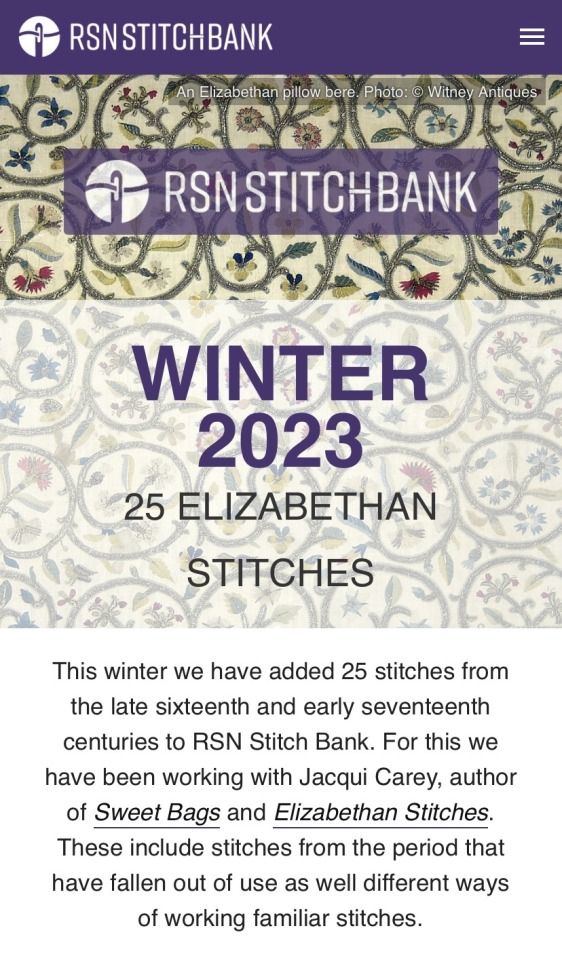

I picked the first one in the 25 recently added Elizabethan stitches, the Elizabethan French Stitch

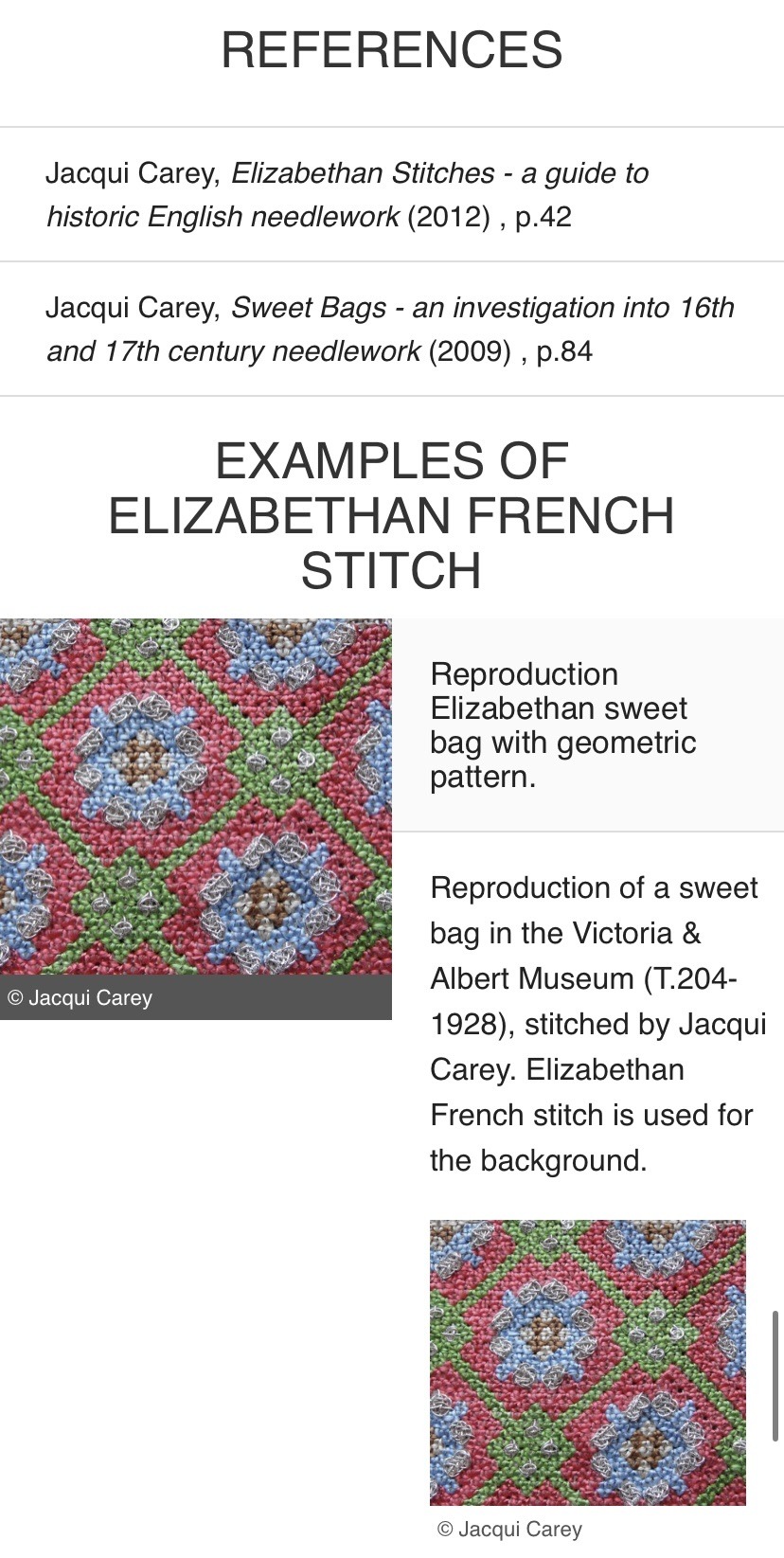
The stitch bank provides written and photo tutorials as well as a video option to learn to do it yourself. There are examples of the stitch in use, resources, references, everything but a needle and thread!
rsnstitchbank.org
Victorian painting of a 17th century scene, with excellent seasonal vibes

Laura Theresa Alma-Tadema (English, 1852-1909)
At the Doorway
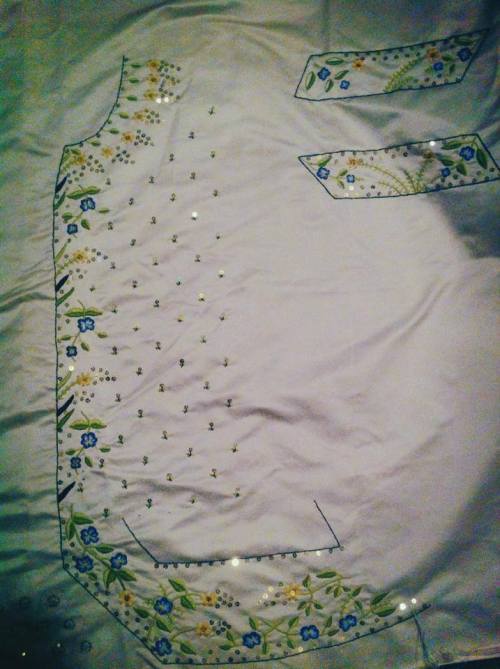
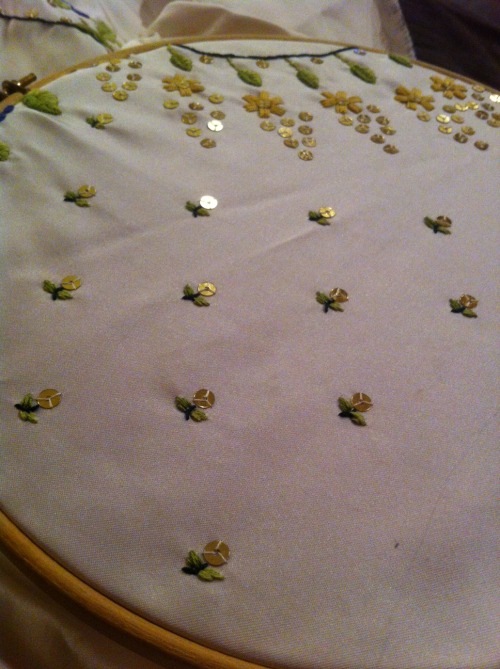
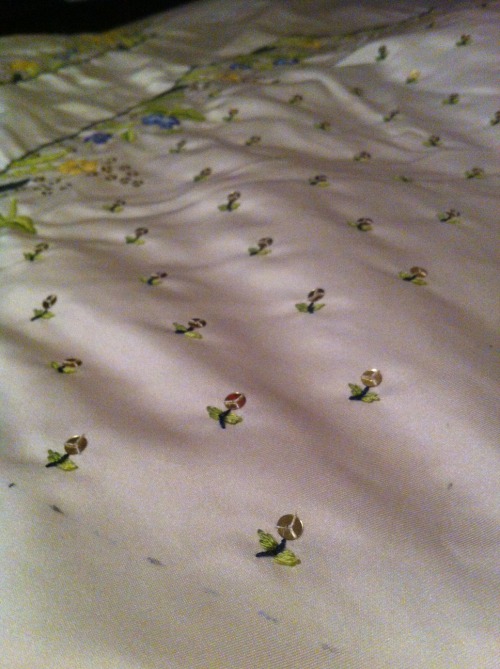
The fill pattern on one half of the waistcoat is finished! Tonight I’ll work on the other side and the remainder of the embroidery on the second pocket flap, and hopefully have all the embroidery wrapped up by tomorrow. Then it’s on to construction!



My latest finished project, based off a couple of extant bodices and a fashion plate which all had this snazzy cross-over front feature.
I actually made the skirt a long time ago as a historybounding, everyday thing to wear. It has alternating panels of striped and solid black cotton, and has a scalloped hem. I love it and wear it often, and decided that I was going to make a matching bodice so I could wear it to costume events, too.

I draped the pattern myself, based off of a couple of extants. Each seam is boned with artificial whalebone and the seam allowances were tacked down by hand with a herringbone stitch. The peplum is lined with black cotton, but the rest is just lined with cheap plain white muslin to save on cost. The bodice closes up the center front with hooks and eyes, and then the wrap panels are folded over and closed at the side seams.
Brain gremlins about my weight are under the cut for those that don't want to read it.
I finished this outfit a while back, but I've been struggling with whether or not I wanted to post it. It's not the outfit, I think that it turned out fabulously. But I've been really unhappy about my weight, and it's been a fight to remind myself that my weight is not my worth. I keep hearing the negative things my mother would say whenever I would gain a pound or two or the "positive" things she'd say when I lost them (things like "oh, you have a chin again!" or "I can actually see your waist now.")
So I'm trying to ignore all that and remind myself how awesome this dress turned out, how hard I worked on it, and how proud I am of the construction of it.
-
 heavymetalandreflective liked this · 2 months ago
heavymetalandreflective liked this · 2 months ago -
 hagrag reblogged this · 2 months ago
hagrag reblogged this · 2 months ago -
 crochetthem reblogged this · 5 months ago
crochetthem reblogged this · 5 months ago -
 percyjacksonsupreme reblogged this · 6 months ago
percyjacksonsupreme reblogged this · 6 months ago -
 percyjacksonsupreme liked this · 6 months ago
percyjacksonsupreme liked this · 6 months ago -
 inkravensketchbook liked this · 7 months ago
inkravensketchbook liked this · 7 months ago -
 dromexa reblogged this · 7 months ago
dromexa reblogged this · 7 months ago -
 dromexa liked this · 7 months ago
dromexa liked this · 7 months ago -
 eridanidreams reblogged this · 7 months ago
eridanidreams reblogged this · 7 months ago -
 thepatchworkcreature liked this · 7 months ago
thepatchworkcreature liked this · 7 months ago -
 silentstep liked this · 7 months ago
silentstep liked this · 7 months ago -
 piizunn liked this · 7 months ago
piizunn liked this · 7 months ago -
 tainry reblogged this · 7 months ago
tainry reblogged this · 7 months ago -
 tainry liked this · 7 months ago
tainry liked this · 7 months ago -
 gaysjureido liked this · 7 months ago
gaysjureido liked this · 7 months ago -
 erismourn reblogged this · 7 months ago
erismourn reblogged this · 7 months ago -
 decepti-geek reblogged this · 7 months ago
decepti-geek reblogged this · 7 months ago -
 decepti-geek liked this · 7 months ago
decepti-geek liked this · 7 months ago -
 artemis-crimson reblogged this · 7 months ago
artemis-crimson reblogged this · 7 months ago -
 pinktinselmonstrosity liked this · 7 months ago
pinktinselmonstrosity liked this · 7 months ago -
 book-of-randomness liked this · 7 months ago
book-of-randomness liked this · 7 months ago -
 princeoftherunaways reblogged this · 7 months ago
princeoftherunaways reblogged this · 7 months ago -
 necromancersdoitbetter liked this · 7 months ago
necromancersdoitbetter liked this · 7 months ago -
 necromancersdoitbetter reblogged this · 7 months ago
necromancersdoitbetter reblogged this · 7 months ago -
 uglymelon liked this · 7 months ago
uglymelon liked this · 7 months ago -
 anteaterisland reblogged this · 7 months ago
anteaterisland reblogged this · 7 months ago -
 anteaterisland liked this · 7 months ago
anteaterisland liked this · 7 months ago -
 aurorave reblogged this · 7 months ago
aurorave reblogged this · 7 months ago -
 aurorave liked this · 7 months ago
aurorave liked this · 7 months ago -
 jelotinousblog liked this · 7 months ago
jelotinousblog liked this · 7 months ago -
 pimpmizziriam liked this · 7 months ago
pimpmizziriam liked this · 7 months ago -
 piratespencil liked this · 7 months ago
piratespencil liked this · 7 months ago -
 rattyjol reblogged this · 7 months ago
rattyjol reblogged this · 7 months ago -
 seaweedsawyou liked this · 7 months ago
seaweedsawyou liked this · 7 months ago -
 osmanthuses liked this · 7 months ago
osmanthuses liked this · 7 months ago -
 lordeoftheshadows reblogged this · 7 months ago
lordeoftheshadows reblogged this · 7 months ago -
 gwenoftheflowers liked this · 7 months ago
gwenoftheflowers liked this · 7 months ago -
 mossterious liked this · 7 months ago
mossterious liked this · 7 months ago -
 little-mouse-adventures liked this · 7 months ago
little-mouse-adventures liked this · 7 months ago -
 artemis-crimson liked this · 7 months ago
artemis-crimson liked this · 7 months ago -
 july-19th-club reblogged this · 7 months ago
july-19th-club reblogged this · 7 months ago -
 turniphair liked this · 8 months ago
turniphair liked this · 8 months ago -
 ladyofmisfortune reblogged this · 8 months ago
ladyofmisfortune reblogged this · 8 months ago -
 hey-bug liked this · 8 months ago
hey-bug liked this · 8 months ago -
 wisconsinwarlock liked this · 8 months ago
wisconsinwarlock liked this · 8 months ago -
 thewanderingroot liked this · 8 months ago
thewanderingroot liked this · 8 months ago -
 tigirl-and-co reblogged this · 8 months ago
tigirl-and-co reblogged this · 8 months ago -
 farmerpillager liked this · 9 months ago
farmerpillager liked this · 9 months ago -
 i-am-agent-washingtub liked this · 9 months ago
i-am-agent-washingtub liked this · 9 months ago -
 hyrulianpirate liked this · 9 months ago
hyrulianpirate liked this · 9 months ago